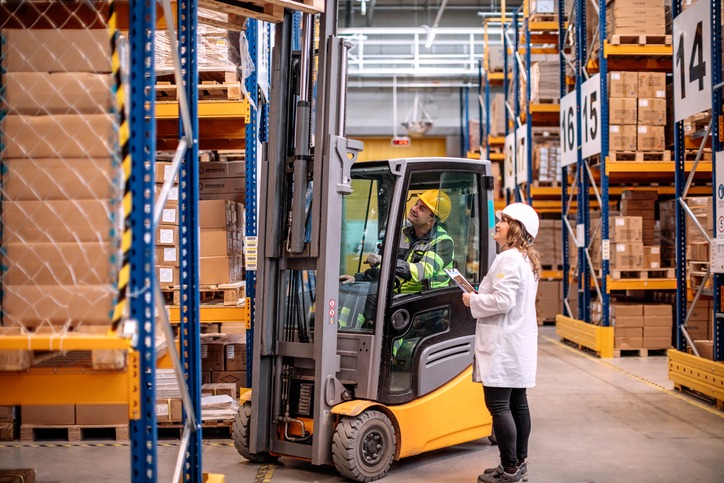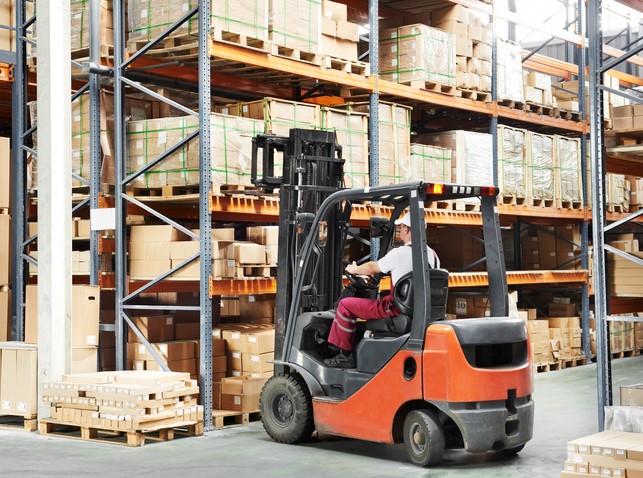What tasks do the production employees perform in logistics, dispatch and order picking?
The work in logistics, dispatch and order picking covers a wide range of different tasks. However, all of these are necessary to ensure that processes run smoothly. This is the only way to make sure that finished products reach the customer without problems.
But logistics goes even further. It also includes the receipt and storage of goods. Order picking prepares individual deliveries according to customer specifications. In addition, further steps include shipping, warehouse organisation, quality control and preparing documentation.
Table of contents
- What tasks do the production employees perform in logistics, dispatch and order picking?
- What do the tasks in logistics, order picking and dispatch look like in detail?
- How do you become a production employee in logistics, dispatch and order picking?
- How much do production employees in logistics, dispatch and order picking earn?
- What are the special aspects of working in warehousing, dispatch and order picking?
Estimated reading time: 8 minutes
What do the tasks in logistics, order picking and dispatch look like in detail?
Warehousing includes the receipt of deliveries such as goods and semi-finished products. Goods are stored for later dispatch and semi-finished products are kept ready for production. Here too, they must be stored properly so that they can be used immediately if required.
- To ensure this, logistics also involves inventory control. This means that production employees manage goods, semi-finished products and raw materials. They make sure these are always optimally available so that production can continue and dispatch to customers can take place after order picking in the warehouse.
- In addition, there is the task of organisation and maintenance. The warehouse must be organised, and the systems and equipment used must be properly maintained. Everything must be set up so that the material flow is as efficient as possible.
- Dispatch begins with order picking. The work in one of the order picker jobs consists of picking goods from the warehouse according to customer orders. They are then assembled into complete deliveries and prepared for dispatch.
- The preparations for dispatch include ensuring that the picked goods are properly packed so they survive transport safely and without damage. Production employees also prepare the shipping documents and coordinate transport.
- Employees responsible for quality control check the completeness of the goods and whether they meet the required quality standards. They also check packaging and shipping documents.
How do you become a production employee in logistics, dispatch and order picking?
Work in warehousing, dispatch and order picking generally does not require specific training. This makes it easier for new workers to enter the market, and it also makes it easier for career changers to move into warehouse worker, packer or other warehouse jobs.
While formal training is not always strictly necessary, it can improve job prospects and increase career opportunities. Relevant training programmes come from the field of warehouse logistics and related occupations.
Applicants should also have other skills. This includes a good level of fitness, as employees have to move a lot of weight. They should also have good organisational skills, IT knowledge and be reliable overall.
Training in the field of warehouse logistics or as a warehouse specialist quickly paves the way to a management position. This not only involves more responsibility, but also higher salary prospects.
Relevant work experience is also welcome. This should relate to work as a warehouse assistant or similar work, for example. It is also good if you have certain language skills. Good German, both spoken and written, is an absolute prerequisite. Thanks to globalisation, knowledge of English is also becoming increasingly important. A class B driving licence and for LGW is also good. Warehouse workers with a forklift licence are also welcome.
There are various options to choose from for further training. The simplest is the specialist for warehouse logistics. You can also aim for further training to become a logistics foreman.
It is also worthwhile to undergo further training to become a forwarding agent. Other options are
- Order picker with Forklift licence
- High bay forklift driver
- Forklift driver
- Front forklift driver
- Reach truck driver

How much do production employees in logistics, dispatch and order picking earn?
The earning potential in warehousing, order picking and dispatch depends on several factors. These include the region in which the company is located, the qualifications of the employee and their professional experience. However, a logistician salary of between €2,300 and €3,500 gross per month can usually be expected. Unskilled workers and newcomers receive lower pay, while skilled workers receive more.
Without specific training, the starting salary is between 2,300 and 2,500 euros gross per month. However, there are also cases where it is in the range of 1,600 to 2,100 euros.
For qualified specialists, on the other hand, who also have the relevant experience, for example as a forklift truck driver in logistics, you can expect more than 3,000 euros gross per month. Depending on the industry, however, salaries can also exceed 5,000 euros gross per month. This is particularly the case if you have additional qualifications. These can consist of further training, a forklift licence or collective agreements.
Certain bonuses further improve the earning potential. These are for public holidays, Sundays and shift work in general. Many companies also offer special payments and bonuses.
What are the special aspects of working in warehousing, dispatch and order picking?
Working in logistics, order picking and despatch involves particular challenges. This applies both mentally and physically. The physical strain results from lifting and carrying heavy loads. This must also be done quickly enough and with sufficient precision. Delivery deadlines must be met and attention must also be paid to the picking and despatch methods.
The handling of technical equipment is also necessary again. This includes industrial trucks, for example forklift trucks, and warehouse management systems. Employees must also observe the principles of warehouse logistics. These include, for example, tidiness, cleanliness and clarity.
There are also a number of relevant safety regulations. These relate to work in the warehouse as a whole or specific aspects, such as working with industrial trucks. This is particularly important when employees work with or stack many or heavy goods.
Another special feature to bear in mind is the pressure of deadlines. There may be times with little work, alternating with times of great hecticness. This is because customers often want to see their orders processed at short notice. Not only do the goods have to be put together, but they also have to be packed correctly and fulfil other requirements in this respect.
Conclusion
The work in logistics, order picking and dispatch is varied and comes with its own challenges. Heavy loads have to be moved, customer requests, safety regulations and delivery deadlines have to be observed and there is a lot of technical equipment to operate.
It is possible to work in this field without training, but a relevant qualification, for example as an industrial truck driver, makes it easier to find a position. It also offers your own career opportunities and better prospects of a higher salary.
Similar topics



